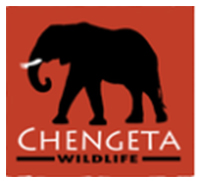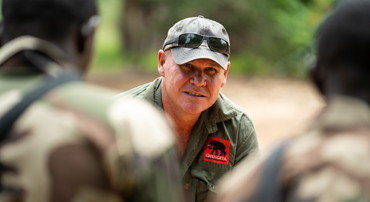In Loving Memory of Rory Young
It’s difficult to not feel an immediate sense of reassurance in Rory’s presence. A big, genuine, gentle smile that reaches his twinkling eyes, a mischievous look about him and yet an impressively calm demeanor. Light, musical Zambian notes emphasize the calmness in his voice, echoing years spent in the bush, but never masking the passion, determination, and urgency, of what must be done. A true force of nature.
Because with Rory, it’s always been about doing the right thing, about protecting wildlife and people, about being compassionate and saying no to bullies, to violence, to injustice.
From his work as a guide and tracker, in human-wildlife conflict, and then as one of Africa’s top strategic trainers, Rory stayed true to his beliefs, applying the at times tough lessons learnt along the way to make his place in a world that desperately needs passion and dedication.
It was a shock, to hear of Rory Young, our leader’s untimely passing, alongside two Spanish journalists documenting anti-poaching efforts, following the terrorist attack that took place in Burkina Faso on a Monday morning, 26th April 2021, whilst he was on patrol with the specialized combined anti-poaching unit in Arly National Park.
Incomprehensible, for his beaming face and smile have always seemed so invincible. It’s hard, writing these words. We think, in particular, of his beautiful family, for whom he lived, in constant awe of his little herd. The shock, anger and disgust are still present, though we find solace in knowing that Rory can now rest in peace in the Netherlands, reunited with his loved ones.
An Exceptional Figure Who Lived a Fascinating and Meaningful Life
He really did have an exceptionally fascinating and meaningful life, and a book couldn’t say it all. But we would like to celebrate some of his achievements and anecdotes nonetheless. Neither the first nor the last tribute to the exceptional man Rory was.
A Wild Life
Born in Zambia, growing up a wild life, exploring the bush across Zimbabwe, Malawi and Zambia, he graduated from the grueling five-year guiding course in Zimbabwe – known for the intensively rigorous training from which only 5% of students emerge as qualified guides with exceptional knowledge. They’re often considered the top in their field.
One of his first jobs was in human-wildlife conflict, which took on a variety of forms, including keeping hippos and elephants out of fields and crops. It was blatant that wildlife conservation would be impossible whilst communities were going hungry with raided crops and laws restricting them more and more for their ways of life. Conservation would not be possible without conversations and listening to livelihoods, without community engagement. This was to become one of Chengeta’s key driving forces.
Following a particularly dark time in his life – that involved being stuck by lightning – Rory made the decision to go back to what he knew, what he loved – guiding. Yet on the ground came the horrifying realization that the new generations of rangers and scouts lacked crucial skills, both for their survival that of the wildlife they were supposed to protect. ‘They needed to know how to travel safely in the bush without being trampled by buffalo, mauled by lions, not catching malaria, and actually being able to find and catch poachers’, said Rory with his usual passionate calm.
From there, he was set on tackling the gargantuan mission that was to end poaching, to build from every single ranger’s skillset and turn them into thriving, efficient, disciplined, law-abiding, caring professionals. Thus, Chengeta’s famous doctrine saw the day – an intelligent, comprehensive, system of techniques, procedures, strategies, a methodology covering all principles in tracking, training, law enforcement, human rights, first-aid, equipment maintenance. An adaptable matrix to be tailored to every situation and environment.
‘We need something that anyone can put in their pocket, a philosophy everyone can understand and that we can teach rangers so they can hit the ground right away. It’s a pointy stick approach – if they have only pointy sticks, then we make them as effective as possible with what they have’, said Rory.
Founding Chengeta Wildlife
As he trained rangers in Zimbabwe, documenting it all, Rory started to find his voice online – often provocative, for he always spoke up and did when no one else would – by publishing his observations and notes the more he worked in the field. Forced to leave the country after his anti-poaching efforts, incredibly efficient, started disturbing high-key individuals at government level, Rory was contacted by the Malawian government for his anti-poaching doctrine, co-written with a former special investigations officer that they had made public online. Within three years, the country’s entire anti-poaching system, from on the ground proactive methods, to arrests, to court procedures, led to a dramatic drop in illegal hunting, and entire networks, from traders to traffickers, were dismantled.
Chengeta Wildlife Was Born
Inspired by the Shona Word ‘To Protect’
Chengeta is an organization dedicated to anti-poaching training across the continent and empowering communities to ultimately protect wildlife. Our logo, the elephant, was chosen for its status as a keystone species – a provider for the ecosystem, crucial for the wellbeing of other living beings, vegetation and soils – as well as an umbrella species: protecting elephants means protecting the landscape, its wildlife and people. An organization that relies on interdisciplinarity, on a plethora of different skills and knowledge, to effectively approach an issue that is as much social, economic, psychological, political, strategic as it is environmental.
Rory was as much a friend as he was a colleague, leader and mentor. It’s perhaps a little ironic – writing a piece to celebrate a man who always put the team and the job first. It’s almost like we can hear him say ‘it’s not me, it’s the team, the people on the ground, the rangers, the communities’. But he brought us all together. Rory had a special talent, an uncanny ability to recognize and surround himself with particular people and skills.
He saw something in every single person he brought into the team, somehow knowing that something incredible would come out of it. He knew how to bring the best out of people, to inspire them, to remove their fear and replace it with determination.
Only he could have created the first every combined unit in Mali and convince the rangers to go where no one else dared venture, saying: ‘We had to remove the fear to show them they could go there, they could be in control and could decide, not the enemy. When we got back, they had that confidence’.
Resonance Across The African Continent
His resonance across the continent is huge. In Mali, the special combined anti-poaching units he brought together and trained are known as the ‘Kind Army’ on the ground, for the support and help the rangers provide communities in areas laden with conflict, terrorism and insecurity. In the Central African Republic, the tensions between communities and rangers have fruitfully grown from conflictual to positive. The list goes on. ‘We’ve never lost a man in the field’ he proudly said. Wherever he and Chengeta stepped in – Mali, the Central African Republic, Malawi, Zimbabwe, more often than not in areas where no one wanted to go, where he was told he would fail – poaching numbers plummeted, trust was built with communities, re-engaged in the preservation of their land, capacities built to ensure people were as independent as possible. But he also always said ‘A loss of life on either side is a failure because it means we haven’t done enough to communicate effectively, to educate around alternatives to poaching’. His approach to measuring success in terms of anti-poaching is a reflection of who he was. ‘As a metric for success: it doesn’t matter how many people you arrest. Is there less criminal activity, is there more peace, love, happiness? Are people getting on? That’s the difference between short term and long-term problem-solving’. Rory was just different. An incredible guide, trainer, strategist, leader, husband, father, and man.
The Herd Must Live on
We struggle to imagine a world without Rory, a world that feels despairingly empty. We ache for his loved ones, for the people he touched in his lifetime, for the wildlife, the communities, the rangers, and for the world, for it has lost one of the most inspiring, kind, passionate souls to have walked across it.
The outpouring of love, emotion, stories that have flooded us, and warmed us, in the time since his passing is just a small indication of the many lives Rory touched during his time on Earth. Anyone who knew him, or knew of him, held him in the highest of regards. He was, and always will be, indestructible, a stark reminder to cherish and support those doing the work, to never forget nor become complacent, to do things ‘while we can, before it’s too late’, as he always said.
Though he may have passed, whilst doing what he loved, protecting wild places, Rory’s legacy now rests upon us, and the fight for what we believe in must continue. He held the torch high, kept a roaring fire ablaze to light up the darkness of the world, to protect wildlife and people alike, to create a space for us all. It is now up to us to hold that flame, to refuse to surrender and ‘to get on with the job’, as Rory would probably have gently scolded us.
Though a character in himself, it was always about the work to be done, the cause. Brushing away attempts of others to put him in the spotlight, even when the focus was on him – in interviews, podcasts, stories – he always found a way to deflect the conversation back to the cause, to the incredible team he’d built with Chengeta,
to collaboration and capacity building, always capacity building. His vision to create something sustainable, that could live on regardless, lies in blueprints built in the last few years. The beating heart of Chengeta will always beat that much harder as we follow his tracks, for this giant of a man will always be guiding us along the way.

